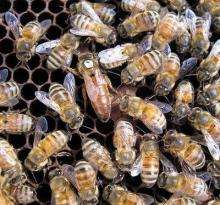Robust network of insect pollinators may collapse suddenly, study finds

The global decline of bees, hoverflies and other pollinators pose a serious threat to food security and biodiversity. A team of scientists from Wageningen University, Netherlands, and Doñana Biological Station show in the prestigious journal Ecology Letters that a further deterioration of conditions for pollinators may lead to the sudden extinction of numerous species.
Many plant species depend for the production of seed and fruit upon pollinators that carry pollen grains from flower to flower. In return for this hard labor, pollinators receive nectar from plants.
Plants are visited by a large number of pollinator species and pollinators visit many different plant species. All these relations together form a robust network of interactions between plants and pollinators. These networks have a characteristic structure that is similar in very different natural landscapes, such as rainforests and river deltas, as well as in human-dominated landscapes with orchards, fields and meadows. Plants and pollinators take a position within those networks that makes the benefit from their mutual relationships for each species individually, and for all plants and pollinators together, as large as possible.
Increasingly harsh conditions
Worldwide, pollinators are under pressure from insecticides, loss of habitat, parasites and disease. These drivers of pollinator decline make it increasingly difficult for pollinators to survive.
The scientists of Wageningen University show, with the help of mathematical models, that the implications of a further deterioration of conditions for pollinators, is strongly influenced by the way in which interaction networks are put together. Due to the structure of these networks, pollinator species support each other under difficult circumstances. Pollinator species that live in the same area may therefore maintain themselves under more difficult conditions.
Tipping point
Pollinator species are, however, also highly dependent on each other when circumstances are harsh. The pollinator community, consisting of bees, butterflies, hoverflies and many other species, may therefore collapse entirely when increasingly harsh conditions pass a critical point. Recovery after conditions have past such a tipping point might not be easy. The required improvement in conditions could be substantially larger than what is needed to return to conditions at which the pollinator community collapsed.
Globally, about eighty percent of plant species depends on pollination by insects and other animals. These include a large number of crops that are important for the production of vegetables, fruits, nuts, spices and oilseed. The direct contribution of pollinators the world food production is estimated at 150 billion Euros (200 billion USD).
More information: J. Jelle Lever, Egbert H. van Nes, Marten Scheffer, and Jordi Bascompte, 2014. The sudden collapse of pollinator communities. Ecology Letters, online 3 January 2014. doi.wiley.com/10.1111/ele.12236
Journal information: Ecology Letters
Provided by Wageningen University














.jpg)




